To read this snapshot as a PDF, click here.
- Security sector reform was a major demand of Tunisia’s 2011 revolution.
- Since then, however, torture and other police abuse have continued with impunity.
- An important reason for the lack of reform is the power of Tunisia’s police unions, which have pressured judges and blackmailed politicians to secure impunity.
- Tunisia needs a law regulating the police unions, limiting their role to advocating for police wages and working conditions, and keeping them out of political and judicial affairs.
- The international community should press Tunisia’s leaders to seize the current political moment to ensure that Tunisia’s police unions are unable to obstruct security sector reforms.
INTRODUCTION
On February 26, 2018, dozens of Tunisian police officers organized by two major police unions stormed a courthouse in Ben Arous, a city just south of Tunis, to disrupt a trial and release five colleagues accused of torture. This flagrant obstruction of justice was but the most recent attempt by such unions to secure impunity for police abuse. This latest episode, however, has sparked a backlash that could present an opportunity for the authorities to rein in the police unions. In light of this window, this Snapshot diagnoses the threats posed by the police unions to Tunisian democracy and offers recommendations to the Tunisian government and its international partners.
POLICE ABUSES AND THE TUNISIAN REVOLUTION
A primary grievance fueling Tunisia’s 2011 revolution was police brutality. The Tunisian who sparked the December 2010 uprising, Mohamed Bouazizi, was driven to self-immolation after a police officer slapped him and confiscated his vegetable cart. Bouazizi’s frustration with the police was widely shared. As the uprising escalated, protesters burned down nearly 600 police stations across the country.[1] Even after President Zine El Abidine Ben Ali was toppled on January 14, 2011, protests continued, with chants of “the people want to purge the Ministry of Interior.”[2]
Bowing to popular pressure, the first post-revolution Interior Minister, Farhat Rajhi, dissolved the secret police and sacked 42 high-level security officials, including all 26 members of the General Directorate of National Security, which had overseen all of the Ministry’s operational departments.[3] Prime Minister Mohamed Ghannouchi also set up a fact-finding commission to investigate the security forces’ killing of 132 protesters during the uprising.[4] For a brief moment, it appeared that major security sector reform was on the horizon.
THE ORIGINAL SIN: CREATION WITHOUT REGULATION
Their rapid reversal from a position of power to one of weakness led the internal security forces—including police, National Guard, and customs officers—to create unions to try to defend their interests. Over the course of 2011, more than 100 unions emerged to represent different units and governorates, eventually consolidating into several national-level, umbrella organizations.[5] Part of the motivation behind forming the unions was a legitimate demand to improve officers’ salaries and working conditions. However, the unions also explicitly sought to stem the revolutionary desire for purging and reforming the security sector.[6]
Post-revolution governments cautiously facilitated the rise of the police unions, even while continuing to ban unions within the military.[7] In May 2011, the Internal Security Forces (ISF) statute was amended to permit members to unionize, though not to strike or to engage in unspecified “political activities.”[8] Similarly, the 2014 constitution permitted the internal security forces to unionize but not to strike, in line with international standards.[9]
Neither the ISF statute nor the Constitution, however, defined the police unions’ roles or outlined clear restrictions on their activities, beyond the prohibition on strikes. Which actions constituted “political activity,” and were therefore out of bounds? Could the unions lobby for the appointment of a particular minister or director? Could they protest the disciplining of a fellow officer for torture?
“The unions were allowed to form without any law to govern them,” explained a retired National Guard officer critical of the unions. “That was a problem. It was not well-studied. Security unions exist in European countries, but their roles are well-defined by the law. They cannot intervene in promotions or in the appointment of a general director, for instance, as they often do here in Tunisia.”[10]
In the following years, Tunisia’s police unions would not only exploit this ambiguity in the law, but also flout even its clear restriction on strikes.

A sign is hung in front of the Interior Ministry in Tunis in protest of the planned firing of Colonel Moncef Laajimi, January 2012. It reads, “Security [services] protect the people = Law protects the security services.” Photo: GNet
BLOCKING REFORM
During the tenure of Tunisia’s first democratically elected government (2011-2014), led by the Islamist Ennahda Party, the police unions tested the waters to see to what extent they could block security sector reform. In January 2012, the new Ennahda Interior Minister Ali Laarayedh, who along with thousands of other opposition figures had been jailed and tortured by Ben Ali’s security agents, attempted to reshuffle the top security officials. He announced the firing of Colonel Moncef Laajimi, the General Director of the Intervention Units who was on trial for killing protesters during the revolution. In response, thousands of officers from the Syndicate of Officers of the General Directorate of the Intervention Units (SFDGUI) went on strike, leaving key installations unsecured, and surrounded Laajimi in Tunis’s Bouchoucha barracks, blocking access to him.[11] A lurid video allegedly of Laarayedh was subsequently leaked, as if in retaliation for his attempt to fire Laajimi.[12] Forced to compromise, Laarayedh instead transferred Laajimi to a consultant position elsewhere in the ministry.[13]
The Laajimi strike was a major victory for the police unions on two fronts. First, they were able to block the removal of a top Ben Ali-era security official. Second, and more important, the episode demonstrated that police officers would not be punished for illegally going on strike—and could even be rewarded.
The police unions made other attempts to defend their fellow officers facing prosecutions. In April 2014, dozens of police officers led by the National Syndicate of Internal Security Forces (SNFSI) protested at a courthouse in Sousse to try to free a colleague on trial for murder. The demonstration reportedly “turned into a three-day police siege on the courthouse and [an] assault on [its] judges and personnel.”[14] In August 2014, after a court in Kasserine sentenced an officer to prison for murder, the police unions protested outside the parliament, holding banners reading “A security officer in jail = support for terrorism.”[15]
In time, the police unions turned to the parliament in an effort to ‘legalize’ police abuse. After terrorist attacks struck Tunis and Sousse in March and June 2015, police unions pushed for the adoption of a sweeping counterterrorism law widely criticized by human rights organizations and activists. The law has an overly broad definition of terrorism that could extend to peaceful political activity.[16] The law also permits the authorities to detain terrorism suspects without charge and without a lawyer for 15 days.
After the passage of the counterterrorism law in July 2015, the police unions began to lobby for a bill drafted by the Interior Ministry entitled “Repression of Attacks against the Armed Forces.” Amnesty International slammed the bill as “institutionalizing impunity,” as it “would authorize security forces to use lethal force to protect property” (not just life).[17] The bill would also criminalize the “denigration” of the security forces, potentially including criticism of police conduct. Finally, the bill would criminalize the unauthorized disclosure or publication of “any information, data, and documents relating to national security,” with no protections for whistleblowers or journalists.
After holding protests to pressure lawmakers to take up the bill, the police unions escalated their tactics in November 2017, fueled in part by the killing of a traffic cop in front of the parliament building.[18] The three largest police unions—the SFDGUI, the SNFSI, and the National Union of Security Force Syndicates (UNSFST)—threatened that if the parliament did not bring the draft law to a plenary session within 15 days, they would stop providing security to the parliamentarians.[19] That threat—to go on strike—was not only unconstitutional, but also tantamount to blackmail. Although the police unions are now allowing the Interior Minister to revise the bill, it remains a priority for them.
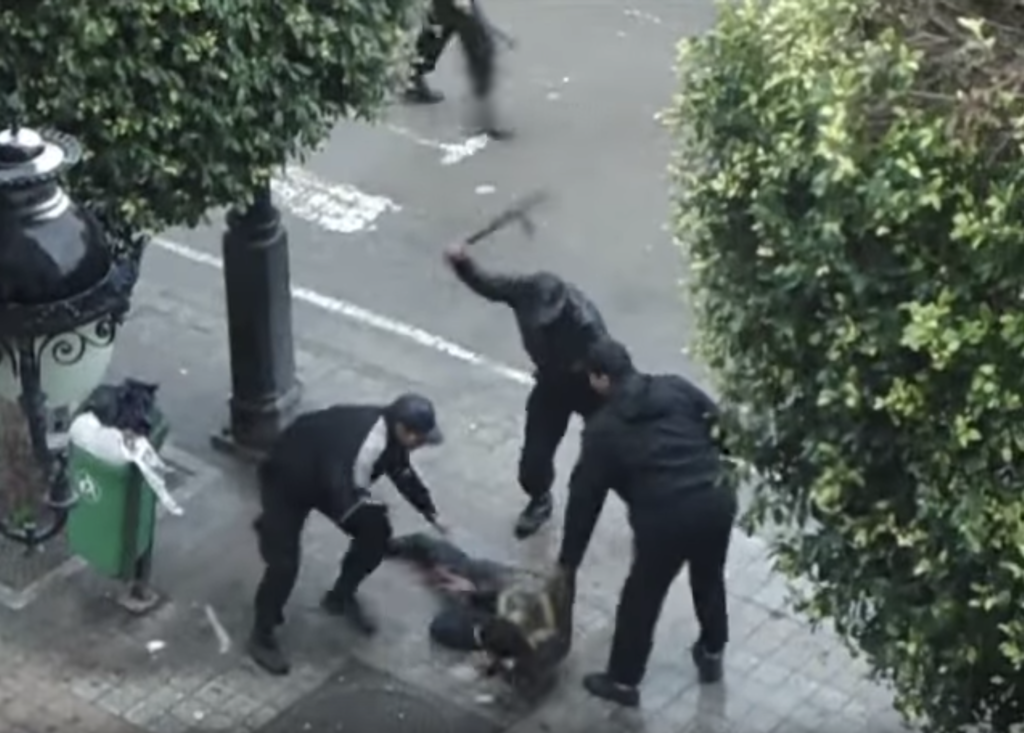
A scene appearing to show violence by security forces against a protester in downtown Tunis a few days after the Jasmine Revolution, January 2011. Photo: FouziTheTunisian/YouTube
THE RETURN OF TORTURE
With the unions to defend them, police officers increasingly have returned to old habits of abusing their power. “Torture is making a comeback in Tunisia,” warned Mokhtar Trifi, vice president of the World Organization Against Torture (OMCT).[20] Amnesty International recently reported on officers’ growing use of “stress positions such as the ‘roast chicken,’ […] electric shocks, and sleep deprivation,” as well as physical beatings and rape.[21] Between 2013 and 2015, the Tunisian League of Human Rights reported 400 cases of torture, while OMCT reported 631 cases between 2013 and 2017.[22] The government’s official figures are lower but also worrying, reporting 81 cases of torture in 2015 alone.[23] Only in three cases have the perpetrators been convicted; in most cases they are not even charged.[24]
Beyond continuing to practice torture, the police have become emboldened to abuse their powers in other ways. Amnesty International contends that as part of the government’s counterterrorism strategy, “the Tunisian authorities have carried out thousands of [security] raids across the country, in which they have often used excessive and unnecessary force, and searched houses without judicial authorization.”[25] Meanwhile, other officers have exploited their positions for financial gain, with traffic cops routinely asking for bribes and customs officials allegedly complicit in smuggling.[26]
The abuse of power by security forces is not simply a small flaw or imperfection in Tunisian democracy: it is a threat to its survival. Police brutality helped to spark the 2011 revolution; its resurgence could breed political unrest once more. Moreover, there is strong evidence that such abuses can fuel violent extremism by generating “anger and resentment toward the state and the police.”[27] Police abuses are some of “the best recruiting tools for terrorist groups,” and accordingly constitute a direct threat to Tunisia’s security.[28] Finally, the police unions’ disruption of trials and blackmailing of politicians erode the rule of law and civilian control over security forces, critical components of democracy.
While some government officials have acknowledged the dangers of police abuse—and the dangers of the police unions that defend such practices—they say that there is little they can do. When the unions were threatening parliament in November 2017, former interior minister and later prime minister Ali Laarayedh, now a top legislator from the Ennahda Party, said that Tunisians were more concerned about security than about security sector reform.[29] Laarayedh cited a recent poll showing that while 84 percent of Tunisians trusted the police, only 22 percent trusted political parties.[30] There was simply no public mandate to rein in the police unions and their abuses.
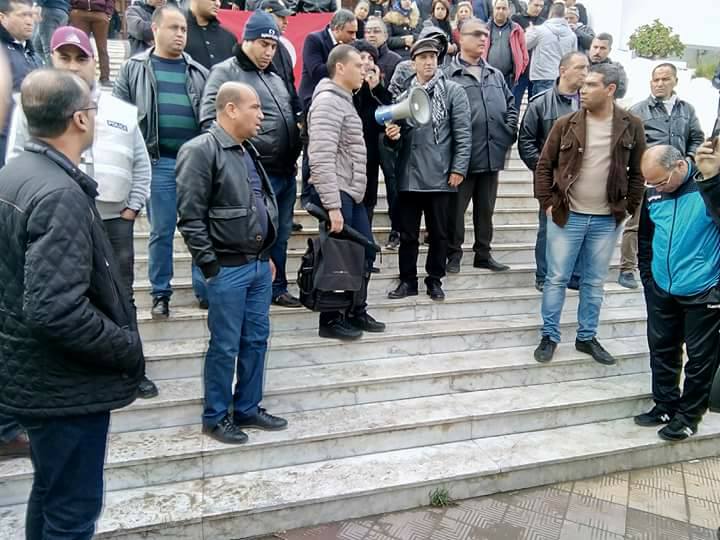
Members of the Syndicate of Officials of the General Directorate of Public Security (SFDGSP) stand on the steps of the Ben Arous courthouse where five of their colleagues were being tried for police brutality, February 26, 2018. Photo: SFDGSP Facebook page
A WINDOW OF OPPORTUNITY?
But the police unions might have overplayed their hand last month. On February 26, the Ben Arous Court of First Instance began a trial of five officers for torture. The officers were accused of chaining a terrorism suspect to a chair, stripping him naked, pouring cold water on him, and beating him unconscious.[31] That morning, dozens of officers from the Syndicate of Officials of the General Directorate of Public Security (SFDGSP) and the SFDGUI stormed the court in an attempt to free their colleagues.[32] Police officers reportedly “invaded the courthouse,”[33] “gathering in the courtroom with their service weapons, while other officers surrounded the building with police cars.”[34] Under this pressure, the court was forced to release the accused officers and clear them of any charges.
In a rare show of unity, lawyers, judges, and civil society organizations immediately condemned the police unions’ obstruction of justice. The Supreme Judicial Council, the independent body overseeing judicial affairs, denounced the “irresponsible” act, while the Judges Union equated it to an act of organized crime.[35] Judges and lawyers together held a “day of rage” on March 1, urging authorities to protect the courts from the police unions.[36] Meanwhile, 15 Tunisian and international human rights organizations issued a joint statement to the government to end police impunity.[37] Independent member of parliament Yassine Ayari even called for the dissolution of the police unions.[38] While the unions had been reprimanded in the past, never before had they been denounced in such a vocal and unified fashion.
This widespread condemnation appeared to come as a surprise to the police unions, who apologized and blamed a ‘conspiracy’ for creating this “trap set to aggravate relations between the judiciary and the security forces.”[39] The Ministers of Interior and Justice announced that they would investigate the incident, and on March 16, a military prosecutor stated that the officers who stormed the Ben Arous courthouse would be tried in a military court, presumably because such courts are guarded by soldiers and not by fellow police officers. The military court will investigate whether the police officers were “undermining the internal security of the State by using their official capacity and an armed or unarmed crowd to attack persons or property, punishable under Articles 32, 77, 78, 79, 107, 114 and 222 of the Penal Code.”[40]
But the Tunisian government should not stop there. The backlash suggests that there may be support among key constituencies for reining in and regulating the police unions. Tunisia must now seize this opportunity to weaken a primary obstacle to security sector reform—the unchecked power of the police unions.
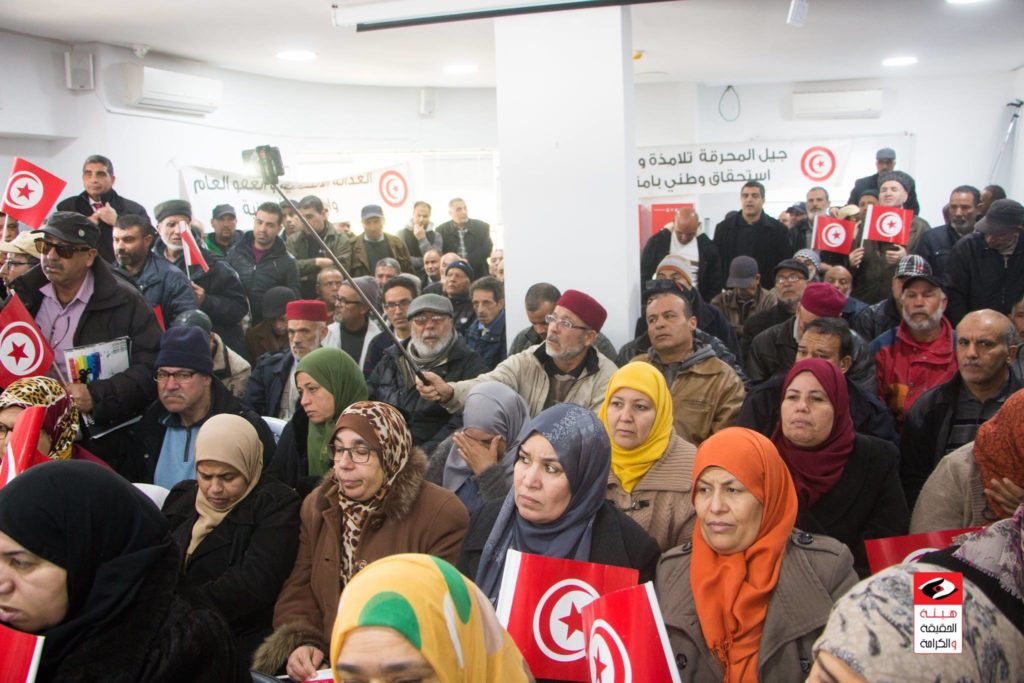
Tunisians attend a hearing of the Truth and Dignity Commission on police abuse during the Bourguiba and Ben Ali dictatorships, January 17, 2018. Photo: Instance Vérité & Dignité Facebook page
POLICY RECOMMENDATIONS
Regulating the police unions is by no means a silver bullet to reform Tunisia’s security sector, which is a complex and long-term undertaking. But it is a necessary first step given the ability of the unions to block reform. With new reform allies in the lawyers’ and judges’ movements, the Tunisian government should seize the opportunity to rein in the police unions and help consolidate Tunisia’s young democracy.
Bringing the outsized police unions to heel, and thereby eliminating security sector impunity, requires two steps. First, the Tunisian government and parliament should draft a new law governing the police unions, in consultation with civil society and in line with international best practices, that circumscribes their role to an exclusive focus on salaries and working conditions. The unions should not be permitted to obstruct justice, interfere in political decisions, or stop providing security to government officials. When protesting, they—like their civilian counterparts—should not be permitted to carry firearms or to storm government buildings.
Second, the Tunisian courts should enforce existing restrictions on police unions, particularly the ban on strikes. Indeed, most democracies, including Australia, Canada, France, the United Kingdom, and the United States, do not allow police officers to strike, due to the essential nature of their work for public safety.[41] In the absence of new legislation for police unions, court rulings can set a precedent on what types of police union activities are permissible.
The United States and Tunisia’s other international partners can play a role in convincing Tunisia to pursue these steps. While many security sector reform (SSR) programs from international donors have focused on improving training, professionalism, and technical skills, what is even more important is creating incentives for police officers to abide by democratic standards. As long as officers can count on the unions to bust them out of court and guarantee impunity, they will have little incentive to follow such standards after the trainings end. The United States should seek to facilitate implementation of critical security sector reforms in the following ways:
- Pursue high-level engagement with the Tunisian government aimed at reining in police unions. As the Tunisian government often is sensitive to diplomatic engagement on human rights-related issues, senior U.S. officials should press Tunisian officials to advance new legislation regulating police unions, underscoring both that security sector abuses pose a potentially fatal threat to Tunisia’s democratic transition and that failure to capitalize on public outrage over incidents like what occurred in Ben Arous would be a huge missed opportunity.
- Condition security assistance to Tunisia on the passage of a new police unions law. The Tunisian government highly values U.S. security aid, which provides Washington with a source of influence over Tunisian action. The U.S. administration and Congress should consider both negative conditionality—withholding assistance until a new law is passed—and positive conditionality, in which the United States would offer additional support not previously on the table if Tunisia moves forward with an updated law in line with international standards.
- Channel U.S. assistance to Tunisian NGOs that monitor police abuses. Congress should consider earmarking a portion of U.S. assistance to Tunisia (a total of $165.4 million in Fiscal Year 2018) to support NGOs that monitor human rights violations by the security forces and advocate for reform. Holding the security sector accountable will require transparency regarding its actions. In light of the Interior Ministry’s incentives to hide its misdeeds, civil society organizations are best positioned to play a monitoring role.
- Strictly implement Leahy Law vetting procedures, a legal requirement for human rights vetting of potential recipients of U.S. security assistance. The United States should ensure that officers suspected of human rights violations are barred from participating in U.S.-funded training programs, and that equipment and assistance are not granted to units facing credible allegations of abuse.
- Coordinate on these steps with our European allies. Although the United States has a strong and growing relationship with Tunisia’s government and its security sector, the European Union and its member states also retain significant influence. Any effort coordinated with Europe would have a greater impact. U.S. officials should work closely with European allies to send a unified message regarding the importance of concrete steps to regulate police unions and to prevent them from obstructing much needed reforms.
NOTES
1. International Crisis Group, “Tunisia: Violence and the Salafi Challenge,” February 13, 2013, 38, https://www.crisisgroup.org/middle-east-north-africa/north-africa/tunisia/tunisia-violence-and-salafi-challenge
2. Querine Hanlon, “Security Sector Reform in Tunisia: A Year After the Jasmine Revolution,” United States Institute of Peace, March 2012, 7, https://www.usip.org/sites/default/files/SR304.pdf
3. International Crisis Group, “Reform and Security Strategy in Tunisia,” July 23, 2015, https://www.crisisgroup.org/middle-east-north-africa/north-africa/tunisia/reform-and-security-strategy-tunisia; Yezid Sayigh, “Missed Opportunity: The Politics of Police Reform in Egypt and Tunisia,” Carnegie Middle East Center, March 17, 2015, http://carnegie-mec.org/2015/03/17/missed-opportunity-politics-of-police-reform-in-egypt-and-tunisia-pub-59391
4. Fifty-three security officials were eventually sentenced for these deaths, most of them receiving three years in prison. See Human Rights Watch, “Flawed Accountability: Shortcomings of Tunisia’s Trials for Killings during the Uprising,” January 12, 2015, https://www.hrw.org/report/2015/01/12/flawed-accountability/shortcomings-tunisias-trials-killings-during-uprising
5. The three largest unions are the Syndicate of Officials of the General Directorate of the Intervention Units (SFDGUI), the National Syndicate of Internal Security Forces (SNFSI), and the National Union of Syndicates of Tunisian Security Forces (UNSFST). In 2015, their members numbered 25,000, 8,000, and 3,000, respectively. See International Crisis Group, “Reform and Security Strategy in Tunisia.” Other prominent national-level unions include the Syndicate of Officials of the General Directorate of Public Security (SFDGSP), the General Syndicate of the National Guard (SGGN), the Syndicate of Customs Agents, and the Republican Security Union.
6. Hanlon, “Security Sector Reform in Tunisia,” 7; International Crisis Group, “Tunisia: Combating Impunity, Restoring Security,” May 9, 2012, 14, https://www.crisisgroup.org/middle-east-north-africa/north-africa/tunisia/tunisia-combatting-impunity-restoring-security
7. Sharan Grewal, “A Quiet Revolution: The Tunisian Military After Ben Ali,” Carnegie Middle East Center, February 24, 2016, 12, http://carnegie-mec.org/2016/02/24/quiet-revolution-tunisian-military-after-ben-ali/iucy
8. See decree-law no. 2011-42 dated May 25, 2011, http://www.legislation.tn/sites/default/files/fraction-journal-officiel/2011/2011G/039/Tg2011422.pdf
9. Jerry Fleming and Monique Marks, “Police Unions,” International Council of Police Representative Associations, http://www.icpra.org/www.icpra.org/sites/default/files/Documents/Library/Police%20Unions%20and%20their%20Influenece/3Police_Unions-FlemingMarks_FINAL.pdf
10. Interview with retired National Guard officer who did not wish to be named, Tunis, February 8, 2018.
11. Hanlon, “Security Sector Reform in Tunisia,” 9; International Crisis Group, “Tunisia: Combating Impunity, Restoring Security,” 16.
12. “Leaked video: ‘The return of Ben Ali’s porno-politics,’” France24, January 20, 2012, http://observers.france24.com/en/20120120-leaked-video-ben-ali-porno-politics-minister-interior-ali-larayedh-ahmed-manai-prison-sex-government-tunisia
13. Laajimi eventually received a two-year suspended sentenced from the military court in Kef. See Human Rights Watch, “Flawed Accountability.”
14. Omar Belhaj Salah, “Tunisia: A democracy and a police state?” Middle East Eye, February 24, 2015, http://www.middleeasteye.net/columns/tunisia-democracy-and-police-state-715059560
15. Salah, “Tunisia: A democracy and a police state?”
16. Human Rights Watch, “Tunisia: Counterterror Law Endangers Rights,” July 31, 2015, https://www.hrw.org/news/2015/07/31/tunisia-counterterror-law-endangers-rights
17. Amnesty International, “Tunisia: Proposed bill could give security forces carte blanche to use unnecessary lethal force,” July 13, 2017, https://www.amnesty.org/en/latest/news/2017/07/tunisia-proposed-bill-could-give-security-forces-carte-blanche-to-use-unnecessary-lethal-force
18. Tarek Amara, “Tunisia Policeman Dies After Attack, Security Unions Seek More Protection,” Reuters, November 2, 2017, https://www.reuters.com/article/us-tunisia-security/tunisia-policeman-dies-after-attack-security-unions-seek-more-protection-idUSKBN1D21OC
19. “Tunisia: Unions call for greater protection for security forces,” Middle East Monitor, November 2, 2017, https://www.middleeastmonitor.com/20171102-tunisia-unions-call-for-greater-protection-for-security-forces
20. Wafa Samoud, “‘La torture fait un retour en force en Tunisie’ annonce Mokhtar Trifi, vice-président de l’OMCT,” HuffPost Maghreb [Fr], October 4, 2017, https://www.huffpostmaghreb.com/2017/10/04/torture-tunisie_n_18183780.html
21. Amnesty International, “‘We Want an End to the Fear’: Abuses Under Tunisia’s State of Emergency,” February 2017, 7, https://www.amnesty.org/download/Documents/MDE3049112017ENGLISH.PDF
22. Imene Boudali, “Radhia Nasraoui : Au moins 15 plaintes pour torture sont déposées chaque mois,” Webdo [Fr], November 6, 2016, http://www.webdo.tn/2016/11/06/radhia-nasraoui-au-moins-15-plaintes-pour-torture-sont-deposees-chaque-mois; Syrine Attia, “Tunisie: sept ans après la révolution, les tortures policières restent taboues,” Jeune Afrique [Fr], March 27, 2018, http://www.jeuneafrique.com/544913/politique/tunisie-sept-ans-apres-la-revolution-les-tortures-policieres-restent-taboues/
23. Rihab Boukhayatia, “La torture en Tunisie entre chiffres officiels et officieux,” HuffPost Maghreb [Fr], April 6, 2016, https://www.huffpostmaghreb.com/2016/04/06/tunisie-torture-chiffres_n_9625608.html
24. Maryline Dumas, “En Tunisie aujourd’hui, on torture encore comme sous Ben Ali,” Middle East Eye [Fr], February 15, 2018, http://www.middleeasteye.net/fr/reportages/en-tunisie-aujourd-hui-torture-encore-comme-sous-ben-ali-708938136
25. Amnesty International, “‘We Want an End to the Fear,’” 6.
26. Sarah Yerkes and Marwan Muasher, “Tunisia’s Corruption Contagion: A Transition at Risk,” Carnegie Endowment for International Peace, October 2017, http://carnegieendowment.org/files/Tunisia_Corruption_Web_final.pdf; “Corrupt Tunisian Police Officer Caught on Camera Demanding Bribe,” The New Arab, June 9, 2016, https://www.alaraby.co.uk/english/blog/2016/6/9/corrupt-tunisian-police-officer-caught-on-camera-demanding-bribe; Fadil Aliriza, “How Tunisia’s Crooked Cops are Undermining the Revolution,” Foreign Policy, February 9, 2016, http://foreignpolicy.com/2016/02/09/how-tunisias-crooked-cops-are-undermining-the-revolution
27. Lola Aliaga and Kloé Tricot O’Farrell, “Counter-Terror in Tunisia: A Road Paved with Good Intentions?” Saferworld, September 19, 2017, https://saferworld-indepth.squarespace.com/counter-terror-in-tunisia-a-road-paved-with-good-intentions/. See also Kevin Sullivan, “Tunisia, After Igniting Arab Spring, Sends the Most Fighters to Islamic State in Syria,” Washington Post, October 28, 2014, https://www.washingtonpost.com/world/national-security/tunisia-after-igniting-arab-spring-sends-the-most-fighters-to-islamic-state-in-syria/2014/10/28/b5db4faa-5971-11e4-8264-deed989ae9a2_story.html; Search for Common Ground, “Root Causes and Drivers of Radicalization to Violent Extremism in Tunisian Communities,” June 2016; and Emna Ben Arab, “Assessing the Threat Posed by Tunisian Foreign Fighters,” Institut Tunisien des Etudes Stratégiques (ITES), January 2018.
28. Anouar Boukhars, “The Geographic Trajectory of Conflict and Militancy in Tunisia,” Carnegie Endowment for International Peace, July 20, 2017, http://carnegieendowment.org/2017/07/20/geographic-trajectory-of-conflict-and-militancy-in-tunisia-pub-71585
29. “Stumbling Blocks on the Path to Democracy,” Center for the Study of Islam and Democracy (CSID) event, November 14, 2017, Washington, DC.
30. Noureddine Hlaoui, “Baromètre politique : L’Armée et la sécurité au top, flop pour les partis politiques,” Radio Express FM [Fr], November 8, 2017, http://www.radioexpressfm.com/lire/barometre-politique-l-armee-et-la-securite-au-top-flop-pour-les-partis-politiques-1442
31. L’Instance Nationale pour la Prévention de la Torture Facebook page [Ar], February 27, 2018, https://www.facebook.com/INPTtn/posts/2247728611911353
32. SFDGUI Facebook page [Ar], February 26, 2018, https://www.facebook.com/268798933134567/photos/pcb.1976798609001249/1976797652334678/?type=3&theater
33. Wafa Samoud, “Le rassemblement sécuritaire armé devant le tribunal de Ben Arous est une atteinte à l’indépendance de la justice, selon le Conseil supérieur de la magistrature,” HuffPost Maghreb [Fr], February 27, 2018, https://www.huffpostmaghreb.com/2018/02/27/csm-securite_n_19328086.html
34. “Le Syndicat des magistrats tunisiens qualifie de ‘crime organisé’ la démonstration de force de sécuritaires au Tribunal de Ben Arous,” HuffPost Maghreb [Fr], February 27, 2018, https://www.huffpostmaghreb.com/2018/02/27/syndicat-des-magistrats-t_n_19329930.html
35. Samoud, “Le rassemblement sécuritaire armé devant le tribunal de Ben Arous est une atteinte à l’indépendance de la justice.”
36. “En Tunisie, ‘les magistrats ne sont pas protégés,’” BBC News [Fr], March 1, 2018, http://www.bbc.com/afrique/region-43239677
37. Human Rights Watch, “Joint Letter: Appeal to the Government to Put an End to the Widespread Impunity,” March 13, 2018, https://www.hrw.org/news/2018/03/13/joint-letter-appeal-government-put-end-widespread-impunity
38. “Plainte de Yassine Ayari pour la dissolution des syndicats sécuritaires,” Realités [Fr], February 27, 2018, https://www.realites.com.tn/2018/02/yassine-ayari-porte-plainte-pour-dissoudre-les-syndicats-securitaires/
39. “Le syndicat de la sûreté républicaine s’excuse auprès des magistrats,” Mosaique FM [Fr], March 2, 2018, https://www.mosaiquefm.net/fr/actualite-national-tunisie/299618/le-syndicat-de-la-surete-republicaine-s-excuse-aupres-des-magistrats; “Syndicat de la sécurité républicaine : « Ce qui s’est passé au tribunal de Ben Arous est un piège »” Webdo [Fr], March 1, 2018, http://www.webdo.tn/2018/03/01/syndicat-de-securite-republicaine-sest-passe-tribunal-de-ben-arous-piege
40. “Affaire du tribunal de Ben Arous: intervention du parquet militaire,” Mosaique FM [Fr], March 16, 2018, https://www.mosaiquefm.net/fr/actualite-national-tunisie/308793/affaire-du-tribunal-de-ben-arous-intervention-du-parquet-militaire
41. The International Council of Police Representative Associations (ICPRA) observes that: “almost universally, police unions are organized without full union status […] and are legally prohibited from taking strike action” (Fleming and Marks, “Police Unions”). In the United States, police unions have (illegally) gone on strike on only two occasions: in Boston in 1919 and in Baltimore in 1974. In both cases, the strikers were fired and the unions had their right to collectively bargain suspended.
SHARAN GREWAL is a Ph.D. candidate in Politics at Princeton University and a visiting scholar at the American Political Science Association. His research focuses on democratization, security forces, and political Islam in the Middle East and North Africa. His dissertation compares the behavior of the military in Egypt and Tunisia after the 2011 revolutions. He is the author of “A Quiet Revolution: The Tunisian Military After Ben Ali” (Carnegie Middle East Center, February 2016). He has also published in the Journal of Conflict Resolution, International Organization, and the Washington Post’s Monkey Cage blog. Sharan previously worked for the U.S. Department of State in the Bureau of Near Eastern Affairs and the Bureau of Democracy, Human Rights, and Labor. He holds an M.A. in Politics from Princeton University, and a B.S. in Foreign Service from Georgetown University. He is on Twitter as @sh_grewal.

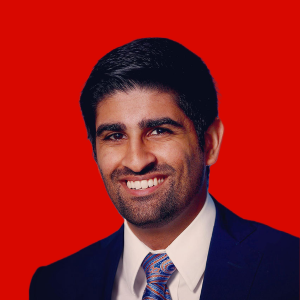
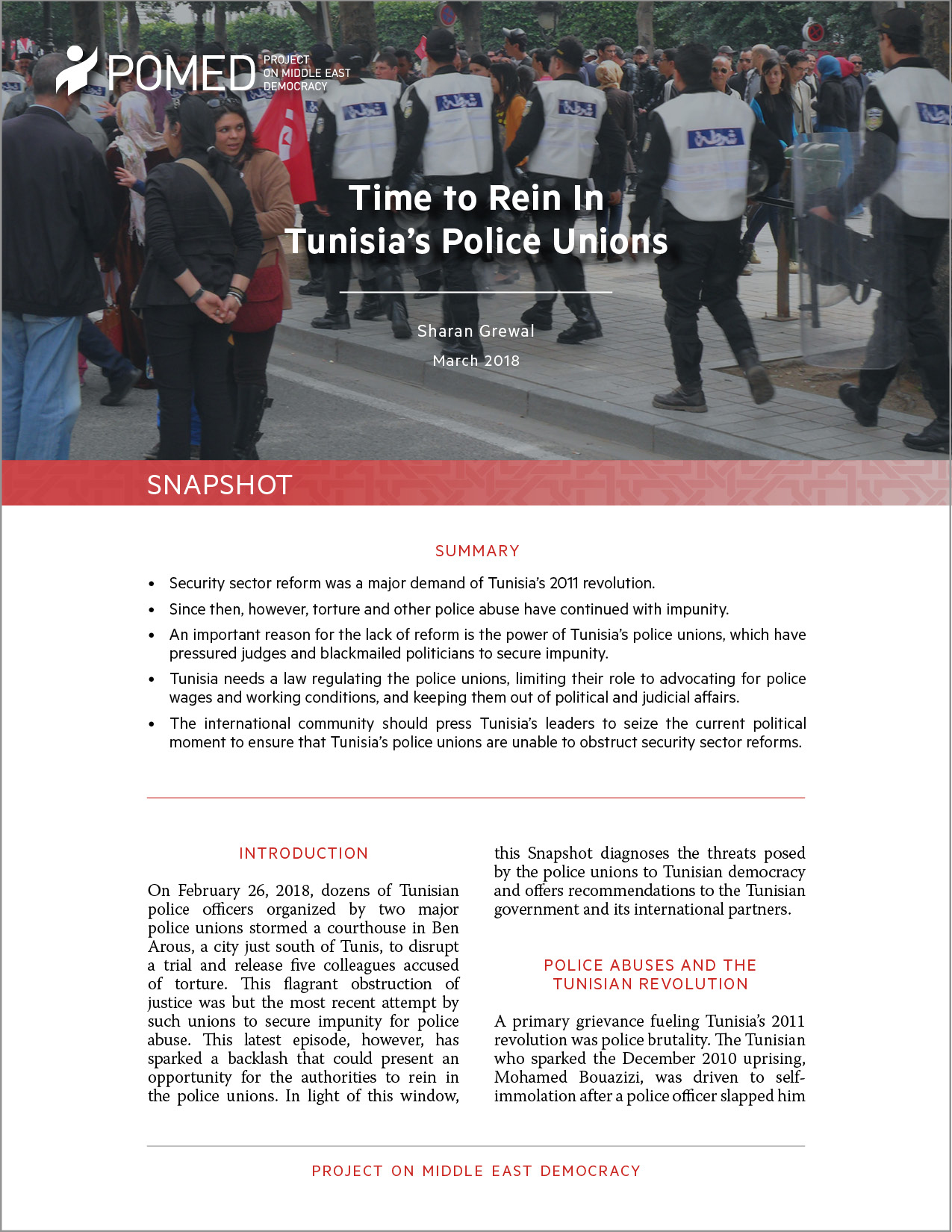


|
Consolidating Power: Tunisian President Kais Saied’s Crackdown on the Judiciary